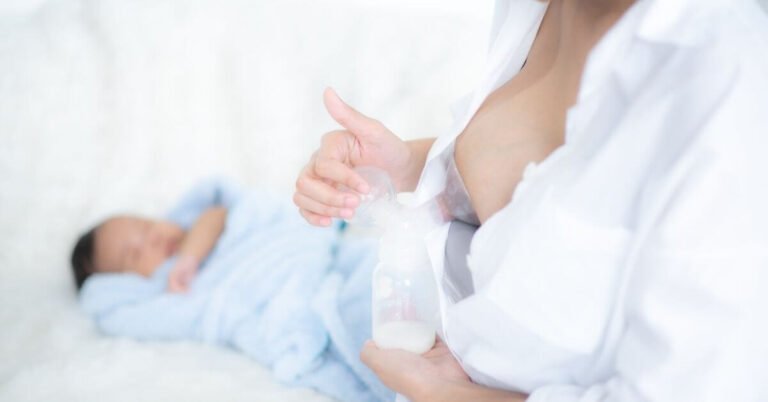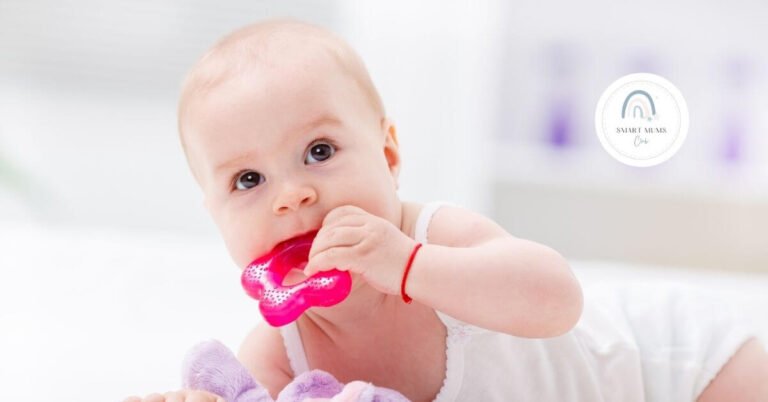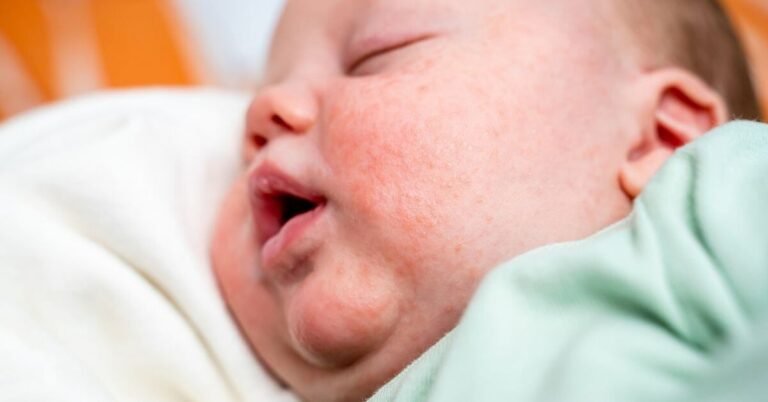What Is The Most Accurate Baby Thermometer?
Having the most accurate baby thermometer on hand is important to measure the temperature when you suspect your baby has a fever.
The number one requirement of a baby thermometer is that it needs to be accurate and consistent. You also do not want a thermometer that gives different readings when you measure several times in a row.
What to look for when buying a baby thermometer?
Some features a good thermometer must have:
- Easy to use
- Easy to clean
- Fast reading
- To read both Celsius and Fahrenheit
Having said that, it’s not that simple to choose the perfect thermometer for your family. You can use a thermometer (oral, forehead, rectal, under the arm, and multiuse). And this can
First of all, you need to decide who you want to use the thermometer for. Is it for your newborn or an older child, or do you need one that the whole family can use? Different thermometers are used for different age groups, especially for kids.
Recommended Way Of Reading The Temperature By Age:
Age 0 -2 years
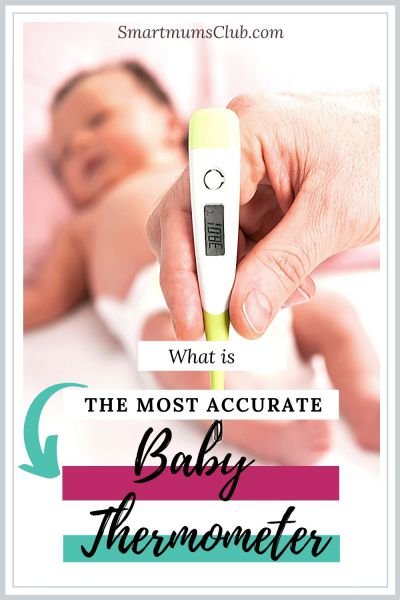
- The preferred choice is a rectal reading.
- The second choice is an auxiliary reading.
Age 2-5 years
- The preferred choice is a rectal reading.
- The second choice is tympanic (in the ear) reading.
- The third choice is an auxiliary (under the arm) reading.
Age 5 and up
- The preferred choice is an oral reading.
- The second choice is tympanic reading.
- The third choice is an auxiliary reading.
Most Accurate Baby Thermometer Top 5
Based on customer reviews and online bestsellers on Amazon and Walmart, we made a list of customers’ favorite and most accurate baby thermometers.
NO 1. BEST BABY RECTAL THERMOMETER
You do not have to spend much to get an accurate baby thermometer. The FridaBaby Quick-Read Digital Rectal Thermometer is just what you need. On Amazon, this thermometer gets the best reviews. Trying to find the most accurate baby thermometer? This is it. The FridaBaby thermometer is suitable for newborns, infants, and toddlers. A nice gesture is that a battery is included. You may be interested in knowing that AAP recommends parents measure their baby’s temperature rectally, at least the first years of the child’s life.
Its coolest features:
- The flexible tip makes measuring a wriggling infant as easy as pie.
- Easy to clean with some water and soap as it’s waterproof.
- The big screen lights up at night, making it easy to read in the nightly hours.
NO 2. THE BEST BABY FOREHEAD THERMOMETER FOR BABY
A must-have baby thermometer is the ADC Temple Touch Digital Fever Thermometer. Designed not only for the baby and the whole family. Parents praise this ear/forehead thermometer’s ease of use, comfortable hold, and fast readings. With more than thirteen thousand positive reviews, who can doubt that? A baby thermometer like this is great if you want the best accuracy.
Its coolest features:
- Easy reading at night with a large backlit display.
- It saves battery life with the auto-off feature
- Measurement is completed with an audible tone.
Not So Cool 🙁
Using one button for multiple functions is difficult for some.
NO 3. A RELIABLE BABY EAR THERMOMETER
You can’t go wrong with this thermometer if you want the most accurate baby thermometer. The Braun Thermoscan 7 Digital Ear Thermometer
Its coolest features:
- There’s a light and a beep to confirm proper placement.
- Displays results with color coding.
- Reads temperature within seconds
Not so cool 🙁
- Slightly more expensive than other thermometers in this category.
- This isn’t for babies under three months.
Quick Tip
If a child has a cold and breathes through their mouth, it may be difficult for them to keep their mouth closed long enough to take the oral reading properly.
NO 4. MOST ACCURATE BABY THERMOMETER FOR ORAL USE WITH APP
There is an app for everything! And yes, also for measuring the baby’s temperature. This thermometer connects to your phone by Bluetooth and has its very own app. The Kinsa Quick Care Digital thermometer is compatible with almost all iOS and Android smartphones. The Kinsa Quick care is approved by the
Its coolest features:
- Suitable for all ages, including newborns.
- The average reading takes less than 8 seconds.
- Advises parents about the next steps to take in case of a fever.
Not so cool 🙁
The thermometer doesn’t work without setting up the location and turning on the Bluetooth.
Quick Tip
After eating or drinking, wait 15 minutes before taking your oral temperature. In other words, food and drinks might affect your thermometer reading.
NO 5. BEST NON-CONTACT BABY FOREHEAD THERMOMETER.
One of the most advanced thermometers for babies is the Tommee Tippee Digital Quick Read Non-
Its coolest features:
- It also measures the surface temperature of a baby’s milk or any other object.
- Stores up to 25 readings to keep track of a child’s fever.
- Easily monitor your baby’s fever while he/she is asleep.
Not so cool 🙁
Keeping the thermometer focused on a restless child’s forehead until it gives a reading can be challenging.
Different Types Of Baby Thermometers
RECTAL BABY THERMOMETER
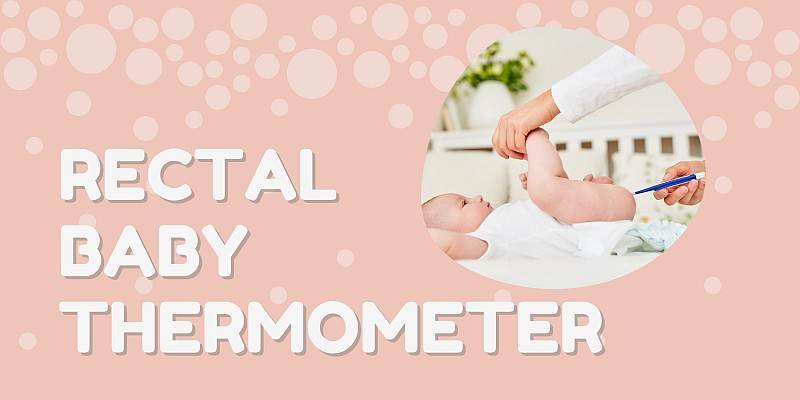
To measure your newborn’s temperature, insert a rectal thermometer into the baby’s rectum. Rectal thermometers will give the most accurate reading; most doctors recommend this as the most accurate baby thermometer. This has nothing to do with the thermometer type, but with the part of the body you measure.
For new mothers, it may appear a scary thing to do to insert a thermometer in the baby’s rectum. But believe me, if you do it correctly, your infant will hardly notice it. The newest rectal thermometers have flexible tips, making them safe and painless for the baby.
AUXILIARY BABY THERMOMETER
The temperature measured under the arm is lower than readings taken in the mouth, rectum, or ear. This is because the temperature is measured outside the body. To measure auxiliary is simple, just put the thermometer under your kid’s armpit, and close the arm snugly over the thermometer. Wait for at least 3 to 4 minutes to read the result. With a temperature equal to or higher than. 37.4°C (99.2°F), your child has a fever.
ORAL BABY THERMOMETER
This method is recommended for children of 4 or 5 years of age as the most reliable way of measuring the temperature. It is surely more accurate than taking the temperature in the ear or under the armpit. Make sure you clean the thermometer before use according to the directions.
To measure the temperature, put the end of the thermometer under the tongue, and tell your child to close the lips around it. Wait until you hear the beeper and remove it so you can read the temperature on the screen. Make sure you don’t use an old-fashioned glass thermometer. Accidentally biting them can cause them to break, making them very dangerous.
TYMPANIC OR EAR THERMOMETER
A tympanic thermometer or baby ear thermometer has to be placed in the baby’s ear canal. It uses infrared light to measure the tympanic membrane’s temperature, also known as the eardrum.
Often using an ear thermometer can be hard for a feverish baby. To keep the child sitting still, the time you need to get a correct reading is difficult. You will want a thermometer that reads quickly. If used correctly, the tympanic thermometer can give an accurate reading in as little as 2 seconds.
FOREHEAD (NO TOUCH) BABY THERMOMETER
This thermometer uses advanced infrared technology to scan the temple from a distance of 2,5 cm.
The No Touch measures the infrared heat given off by the arterial blood supply under the temple skin. This infrared thermometer is the most accurate baby thermometer if you don’t want to wake your sick child to take its temperature.
Baby Thermometer Fever Chart
Depending on the child’s age and level of activity, a child’s normal temperature may vary. Readings can also be affected by the time of day. During the late afternoon and early evening, body temperatures are highest, while during the night and early morning, they are lowest. Furthermore, infants usually have higher temperatures compared with older children. True fevers are generally considered to be:
- Rectally measured: higher than 38°C (100.4°F)
- Orally measured: higher than 37.5°C (99.5°F)
- Auxiliary measured higher than 37.3°C (99.1°F)
- Tympanicaly measured higher than 38°C (100.4°F)
Which Baby Thermometers Should You Not Use?
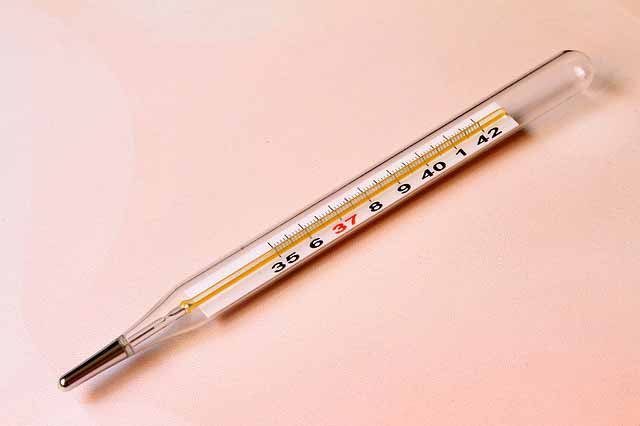
Old-fashioned glass thermometers are no longer recommended because they can easily break or leak dangerous and toxic mercury. If you still have a mercury thermometer, get rid of it, advises the American Academy of Pediatrics (AAP). There are much safer thermometers on the market nowadays.
The plastic strip thermometer contains (thermochromic) liquid crystals. These liquid crystals change color at different temperatures. Put on the baby’s forehead for 15 seconds; a color change will indicate the temperature. These strips are inexpensive and the least accurate making them not the best baby thermometer for a child.
Pacifier thermometers are digital thermometers housed in a silicone pacifier. This method works only with a baby that will keep a pacifier in his mouth for at least 2 to 3 minutes without moving. Before each use, you must check these thermometers, as harmful components may leak from the pacifier if a child bites on it.
Source:








